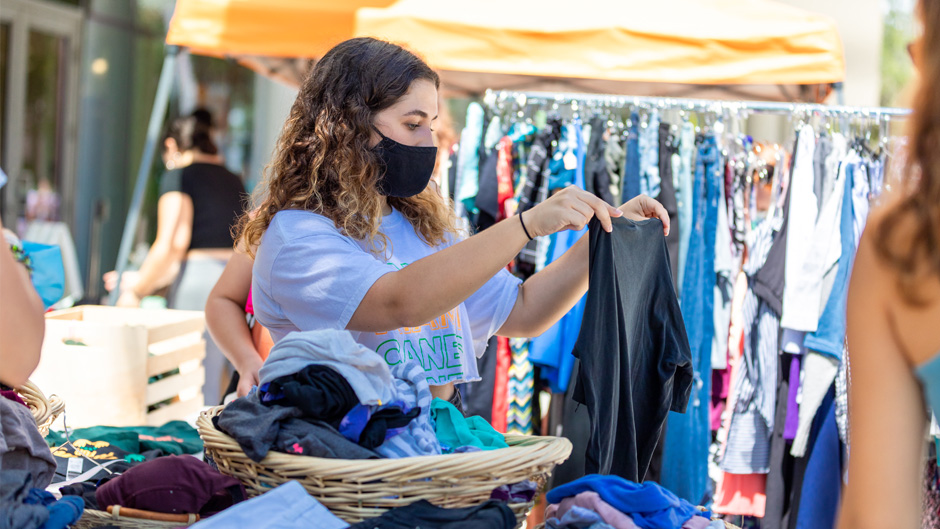Campus community gives clothes a second life
Ashley A. Williams, 09-29-2021

From vintage graphic tees to bucket hats, secondhand or upcycled clothing and accessories have become increasingly popular among those who are part of Generation Z, who were born in the mid-to-late 1990s through the early 2010s.
When Anna Coon, junior broadcast journalism and political science major, began her studies at the University of Miami, thrifting became a large part of her everyday life.
Today, she is the president of the student organization UThrift, and a campus advocate for repurchasing or swapping secondhand clothing to reduce our carbon footprint. Once a week, the group hosts a pop-up shop on the Coral Gables Campus to provide free clothing and accessories, while also collecting donations.
“We’re seeing so many more people on campus this year,” said Coon, a native of Sharon, Connecticut. “It’s been so great. We’ve got over 400 donations last week, and we’re seeing about 200 people at the stand every week.”
There are many reasons why thrifting—which means shopping at a thrift store or a place where gently used, discounted items are sold—has become a viable option to finding clothes that are generally more expressive, unique, and affordable than what many larger corporations make available today. According to Coon, one of the main reasons are to combat the harmful effects of “fast fashion,” which refers to low-quality trendy attire that is likely rapidly designed and manufactured in high volumes.
“Fast fashion for a very long time was not seen as a huge problem, but now people are seeing it,” said Coon. “Especially for college students, because we are so adamant to dress with trends and also find things that are super affordable. And those two things combined create a lot of problems.”
Thrifting for college students gives the option to not only help the planet, but also to elongate the life of an article of clothing. Coon said she and her peers are cognizant of the long-term effects that supporting fast fashion has had on climate change thanks to information being shared on social media and spread amongst grassroot organizations like their own—and many of them want to be the ones to create change.
“Fast fashion is more than just pollution and climate problems,” said Coon. “It also has a lot to do with equality issues.”
For instance, Coon said with every purchase we make as consumers, we should question where the clothes are being made, if children are being forced to make the clothing, whether workers are being underpaid and underappreciated, and if the workers toil in conditions that are harmful to them.
To put this in perspective, textile dyeing in large quantities produces toxic chemicals that subsequently run off into the world’s oceans. Furthermore, more than “100 billion garments are produced each year, which is two times more than 15 years ago,” according to thredUp, an online consignment platform. Additionally, the website notes that “Buying one used item reduces its carbon, waste, and water footprints by 82 percent.”.
Among Gen Z and millennials, sustainable fashion is more than just a hot topic. Studies show that millennials prefer to buy clothing that helps the environment. And Gen Z currently makes up more than 40 percent of global consumers, according to Forbes. Retailers and corporations all over the world have reshaped their core values and market strategies to include more sustainable options, like recycled or plant-based materials and have reformed their production processes to be more environmentally friendly.
Phoebe Klein, UThrift’s creative director and a senior studying creative advertising, designed an infographic with statistics that compare the life cycle assessment of products to share with students each time they donate through the organization. The group’s overarching mission is to increase secondhand shopping in Miami-Dade County and to decrease new clothing production overall. So far, their efforts of sharing information and making others aware are making a great impact.
UThrift was originally established as a Student Government ECO Green Committee initiative in 2017. It hosted its first pop-up event in spring 2018 and was designated an official student organization by the Committee of Student Organization in spring 2020.
Growing from a small table in front of the Otto G. Richter Library in 2017 to a large, tented fixture at the weekly Well ’Canes Market in 2021, the student-led organization has come a long way. Today, the club has more than 70 members and volunteers and is looking for new members every day. The pop-up store has received more than 1,400 total donations this semester alone.
Danielle Houck, the organization’s advisor and a senior lecturer in the College of Arts and Sciences, said she is impressed and proud of the organization’s commitment to sharing its sustainable fashion vision with the campus community.
“They have shown incredible initiative and leadership since their inception,” said Houck, who has been at the University for more than 20 years and teaches writing studies. “Thanks to UThrift’s efforts, UM students have learned about the climate footprint of fast fashion and changed their consumer choices.”
Students of Houck’s have shared with her their love for the planet and how purchasing secondhand is their own way of making an immediate and deliberate effort to do their part.
“It’s amazing to see how such a young club is making such a positive impact on our campus,” said Houck. “With their programming, where they are hosting workshops on how to sew buttons and save their outfits. It’s amazing to see.”
To continue their sustainability efforts on the Coral Gables Campus, students and faculty and staff members are invited to join UThrift on Oct. 20 for their Swap & Strut: Re-use the Runway Fashion Show that begins at 4:30 p.m. The event will take place on the Lakeside Patio and Stage.
For more information about the organization, contact uthrift.contact@gmail.com or follow the club on Instagram @um_uthrift.